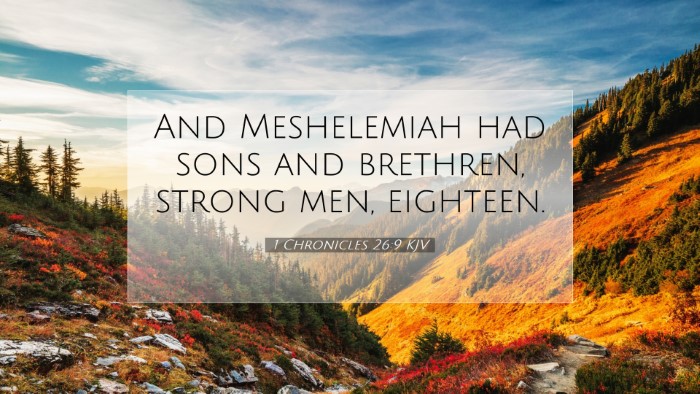Commentary on 1 Chronicles 26:9
Verse: 1 Chronicles 26:9 (KJV): "The children of Shemiah; Othni, and Rephael, and Obed, and Elzabad, and his brethren, strong men, Elihu and Semachiah."
Contextual Overview
The Book of Chronicles is primarily a historical narrative aimed at Israel, reflecting on genealogies and temple service. Within this framework, 1 Chronicles 26 provides detailed accounts of the duties of the Levites, particularly in relation to the temple and its sacred articles. It emphasizes orderliness in service and the importance of faithfulness in the ministry.
Significance of the Verse
This verse highlights the descendants of Shemiah, a Levite, outlining names synonymous with strength and reliability in service. Each name represents individuals who played a vital role in the spiritual life of Israel during the time of King David and the establishment of the temple worship.
Insights from Public Domain Commentaries
Matthew Henry's Commentary
Henry emphasizes the importance of each individual named as part of God's divine purpose. He notes that the strong men mentioned were essential not only for physical labor but also as models of spiritual strength and loyalty. Henry argues that the mention of their strength signifies the need for capable individuals who can withstand challenges in ministry.
Albert Barnes' Notes on the Bible
Barnes offers a detailed view of the names specifically noted for their significance. He observes that the mention of Obed indicates a role in service to the temple, reflecting the Levites' responsibility for guarding sacred items. Barnes highlights that each name has historical significance, drawing a narrative that connects the past lineage with the current service, thereby grounding the present practices in ancestral faithfulness.
Adam Clarke's Commentary
Clarke points out that the names described convey roles associated with trustworthiness in fulfilling temple duties. He analyzes the text's structure, identifying the use of listing and classification to show the organized nature of the priestly duties. According to Clarke, the emphasis on being "strong men" denotes a physical and moral imperative for those serving in sacred roles, showcasing that spiritual leadership requires both inner faith and outer strength.
Theological Reflections
From these insights, we observe that 1 Chronicles 26:9 speaks not only to historical roles but also to contemporary applications:
- Strength in Service: The depiction of strong men encourages the modern church to cultivate leaders who are both spiritually and morally strong.
- Legacy of Faithfulness: The genealogical focus serves as a reminder to current generations of their spiritual heritage and the importance of passing down faith.
- Organization in Ministry: The listing format highlights the necessity of structure within church roles, suggesting that an orderly approach helps to maintain reverence and commitment in service.
Lessons for Pastors, Students, and Theologians
This verse and its commentaries provide valuable lessons:
- Leadership Development: Leaders should be trained not only in doctrinal knowledge but also in resilience and character, as exemplified by the strong men outlined in this passage.
- Understanding Biblical Roots: Both clergy and lay leaders must appreciate the historical context of their faith to fully realize their role in the continuation of that legacy.
- Commitment to Community: The mention of “brethren” implies a focus on community and collaboration, underscoring the need for unity in the church.
Conclusion
1 Chronicles 26:9 serves as a concise yet profound reminder of the roles of strength, faithfulness, and community in spiritual service. Through the insights of esteemed commentators, one can glean an understanding that transcends historical narrative, offering applicable truths for today's believers.


